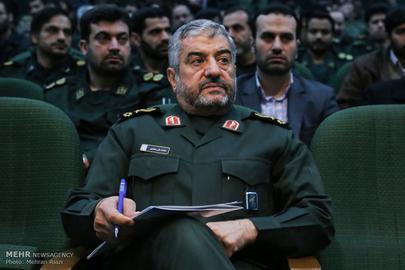A day after US President Donald Trump offered to meet Iran's leaders with "no preconditions" and "any time they want," Major General Mohammad Ali Jafari, the top commander of the Revolutionary Guards, rejected his offer in no uncertain terms. “You have to take this dream to your grave that the Iranian people will allow their officials to meet and hold talks with the Great Satan," he wrote to Trump on July 31. “Even the future presidents of the United States will not see that day.”
The response from one of the Islamic Republic’s highest military officials came before President Rouhani’s government had yet to officially accept or reject the offer for such a meeting.
So when General Jafari addressed Trump’s offer of negotiations, did he break Iranian law by interfering in the political and non-military decisions of the government?
The letter, first published by the Guards-affiliated Fars News Agency [Persian link], came hours after the general wrote to President Rouhani. “Why don’t you use the same force and fury that we know you have and have used in elections or in the face of some of your opponents to handle shortcomings and mismanagement of the government’s economic sector?” the letter urged.
Media close to the Revolutionary Guards described the letter to Rouhani as “heartfelt;” however, they did not use the same term to describe Jafari’s letter addressed to Trump, perhaps as a way of giving these comments “official” significance.
A week earlier, another Revolutionary Guards general warned Trump in response to the US President’s threatening tweet. “Are you threatening us?” General Ghasem Soleimani, head of the expeditionary Quds Force, demanded to know on July 23 during a speech at a ceremony commemorating the martyrs of the Iran-Iraq war [Persian link]. “Even the Iranian armed forces need not get involved. I myself and the Quds Force are a match for you...Know this: not one night goes by that we go to bed without thinking about your annihilation.”
What Does the Constitution Say?
For all practical purposes, the US government ignored General Soleimani’s statements. But in international political and legal discourse, the responses signifies a readiness for war against a foreign enemy. But under Iranian law, this is a power granted to the Supreme Leader and not the armed forces. Article 110 clearly states that the “declaration of war and peace, and the mobilization of the armed forces” are powers that belong to the Leadership. However, it is possible that Ayatollah Khamenei backs Soleimani and Jafari’s statements.
After Ayatollah Khomeini issued a decree to amend the constitution in 1989, the creation of the Supreme National Security Council (SNSC) followed. According to Article 176 regarding its establishment, the council is responsible for “safeguarding the national interests and preserving the Islamic Revolution, the territorial integrity and national sovereignty.” Other responsibilities of the council include “coordination of activities in the areas relating to politics, intelligence, social, cultural and economic fields in regard to general defense and security policies” and the “exploitation of material and intellectual resources of the country for facing internal and external threats.”
In other words, military officials are not empowered to decide about negotiations with the United States or to reject an offer by the US president even in times where relations are steady, let alone at at time when tensions between the two countries are unprecedentedly high and the leaders of both countries have exchanged threats. Under such conditions, it is the Supreme National Security Council that has the power to decide the issue and its decisions become the law once they are approved by the Supreme Leader.
Of course the Supreme Leader is authorized by the constitution to make such decisions on his own, as Ayatollah Khamenei did when he permitted early US-Iran nuclear negotiations in 2013, hosted by Oman. These negotiations went on for many months behind the scenes without the knowledge of Saeed Jalili, who was then the SNSC’s secretary. These negotiations succeeded in preparing the grounds for a public agreement between the two countries.
Therefore, neither the laws of the Islamic Republic nor close to 40 years of precedent allow Iran’s military commanders, including the commanders of the Revolutionary Guards or of the armed forces, the power to make political decisions for the government. Following the norms of the modern world, even Ayatollah Ruhollah Khomeini, the founder of the Islamic Republic, repeatedly forbade military officials from interfering, by word or by action, in the political domain of the government — whether in support or in opposition.
Stay Out of Politics
Some have interpreted General Jafari's response as Iran’s official rejection of Trump’s offer. It is possible Jafari felt justifying saying what he did by relying on Article 1 of the Charter of the Islamic Revolutionary Guards Corps [Persian link], which declares its mission to be “safeguarding the Islamic Revolution of Iran and its achievements.” Revolutionary Guards officials have often used this article to justify their words and deeds. But Article 47 of the same charter clearly states that the Guards “must never turn into a party or act as a political party or organization.”
On August 1, a day after General Jafari’s letter, 18 members of the parliament issued President Rouhani with a warning: “Irresponsible statements by military and non-military officials about domestic or foreign affairs” must be prevented so that the Islamic Republic can speak to the world “in one voice” and so that the country “will not have to pay a price” for their statements [Persian link].
The MPs reminded President Rouhani that, according to Article 113 of the constitution, “after the office of Leadership, the president is the highest official in the country” in matters both domestic and foreign. It is difficult to believe that the parliamentarians’ statement had nothing to do with the pronouncements of General Jafari, and General Soleimani before him.
Even if General Jafari’s rejection of Trump’s offer to negotiate with Iran reflects the views of Ayatollah Khamenei, who has absolute powers under the constitution, the rejection of an offer by a military commander from a head of state, especially when relations between the two countries are extremely tense, is considered to be very odd and unconventional by international standards.
With the approaching reimposition of US sanctions against Iran and other US threats against the Islamic Republic, it is is no surprise that the Iranian public has expressed concern over statements by “military and non-military” officials, which some members of parliament have described at “irresponsible.”
Parliamentarians Object
A day before this unprecedented warning from the Iranian parliament, Ali Motahari, the deputy speaker of the parliament, implicitly criticized the Revolutionary Guards Corps, suggesting it was responsible for the current crisis in Iran because of its insistence on continuing missile tests [Persian link]. The US has cited these tests as one of its reasons for leaving the nuclear agreement, and the Iranian government has, as a result, been denied the chance to benefit from the agreement before Trump withdrew from it.
According to the head of the Joints Chiefs of Staff of the Iranian Armed Forces, missile tests must be approved by the Supreme Leader and so, unlike statements by General Jafari, they do not violate the constitution. Nevertheless, even these “lawful actions” are, little by little, depriving the Iranian government of the power of fulfilling its inherent duties — a sign of increasing legal conflicts and contradictions that are highly costly for the citizens of Iran.
More on the recent war of words between the Islamic Republic and the US government:
Iran’s Revolutionary Guards Commander Threatens Trump, July 26, 2018
Decoding Iran’s Politics: The 12-Point US Ultimatum, July 6, 2018
Can Iran Legally Close the Strait of Hormuz?, July 5, 2018
The 12 Demands of Pompeo's New Iran Strategy, May 21, 2018
Pompeo to Lay out New Iran Strategy, May 21, 2018
visit the accountability section
In this section of Iran Wire, you can contact the officials and launch your campaign for various problems

























comments